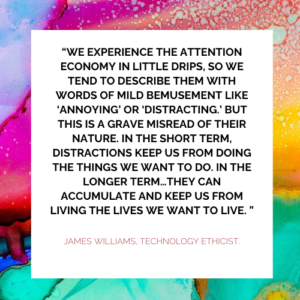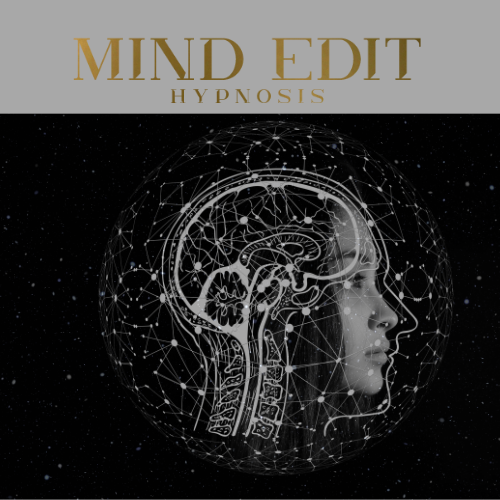
Hey Friend!
I don’t know about you, but I have mixed feelings about social media. As a business owner, sure, it’s a great way for people who don’t know me to learn more about me and my work. And, personally, I love finding cool artists, yoga instructors, activists, vegan chefs and other wellness practitioners through social media.
But there is also a real shallowness to social media and when I consume too much of it, I begin to feel insecure (compare and despair) and guilty for wasting so much time. It’s for those reasons that I purposely limit my time on the platforms.
Jeff Orlowski’s Netflix documentary,The Social Dilemma, exposed the horrifying reality that WE ARE THE PRODUCT the SM companies are selling; our attention, privacy and activity is being tracked, targeted and sold at profit margins never before seen in the history of commerce.
And now, there is a new trend by tech and social media companies to throw around terms like “ethical persuasion.” It’s like a PR campaign designed to mitigate their role in using people’s precious time for profit. In her book, How to Do Nothing: Resisting the Attention Economy, artist, writer and educator at Stanford University, Jenny Odell, explains that companies are now working on ways to “make persuasion more ethical…using ‘harmonious designs that continuously empower us instead of distracting and frustrating us.’” She goes on to argue, “I can’t help but ask: Empower me to do what? Good for me according to whom? And According to what standards? The idea that I’ve already lost the battle of attention doesn’t sit right with me, [I’m more] interested in gaining control of my attention rather than simply having it directed in ways that are deemed better for me.”
The more we give away our attention, the more we are pulled away from the people in our communities, from our own independent thoughts, and from our own intrinsic interests. Technology ethicist James Williams warns that the attention economy, “undermines our capacities for reflection and self-regulation, making it harder, in the words of Harry Frankfurt, to ‘want what we want to want.’ Thus there are deep ethical implications lurking here for freedom, wellbeing, and even the integrity of the self.”
In 1997, theoretical physicist [Micheal Goldhaber](https://econreview.berkeley.edu/paying-attention-the-attention-economy/e) asserted that information is not scarce, attention is. At the end of her book, Odell says, “Sometimes boycotting the attention economy by withholding attention is the only action we can take. Other times, we can actively look for ways to impact things like the addictive design of technology, but also environmental politics, labor rights, women’s rights, indigenous rights, anti-racism initiatives, measures for parks and open spaces, and habitat restoration–understanding that pain comes not from one part of the body but from systemic imbalance.” Odell reminds us that limiting our screen time also allows us to make a bigger impact in the world and especially on the people in our community.
As an advocate for and lover of hypnosis, I use my daily hypnosis practice to bring me back to the present moment, where I can control my actions and behaviors. My practice allows me to listen to my breath, feel aware of my emotions, and connect back to this time and this place. From there, it’s easier to resist the temptation of reaching for my phone out of habit.
Here are 5 additional tips I’m trying to refocus my attention and start cultivating greater attention and presence:
1. Stop using my phone in bed. My phone charger is on my bedside table, so it’s convenient for me to lie in bed reading articles, checking SM and perusing the internet. But, I’ve decided to move the charger into the kitchen, starting today!
2. Allow myself to DO NOTHING. I get anxious sometimes, thinking that I have to constantly be working or producing to be successful, but I’m working on that limiting belief…and instead reinforcing the new belief that I am inherently worthy.
3. Go out into nature EVERY DAY and pay attention to what I see, feel and experience. I sometimes walk my dog outside, while staring at my phone! Now, I will practice taking deep breaths, observing the plants and animals around me, and smiling or greeting anyone who walks past me.
4. Set and enforce a new rule: no phones at the dinner table!
5. Make art and play. I’m going to carve out time in my day to play. Today, I will paint and tomorrow, I will practice playing Taylor Swift’s “Cardigan” on the piano.
6. Post and engage intentionally on SM. Because I know that scrolling through social media can put me in a hypnotic trance, I’m very careful to stay mindful of how I feel and what catches my attention. If it feels icky, I sign off and take a break. Likewise, I only post things that I think will inspire or benefit people’s lives.
7. Turn off notification badges on all social media and set screen time limits through my Screen Time app.
I hope this information was useful and worthy of your attention. I feel like most of us are dealing with negative habits and addictions around our phones and, in particular, social media. I don’t know how practical it is to outright quit all social media. I’m not going that far (yet); I think we all have to decide what balances and benefits our lives.
Happy editing,
Robin



